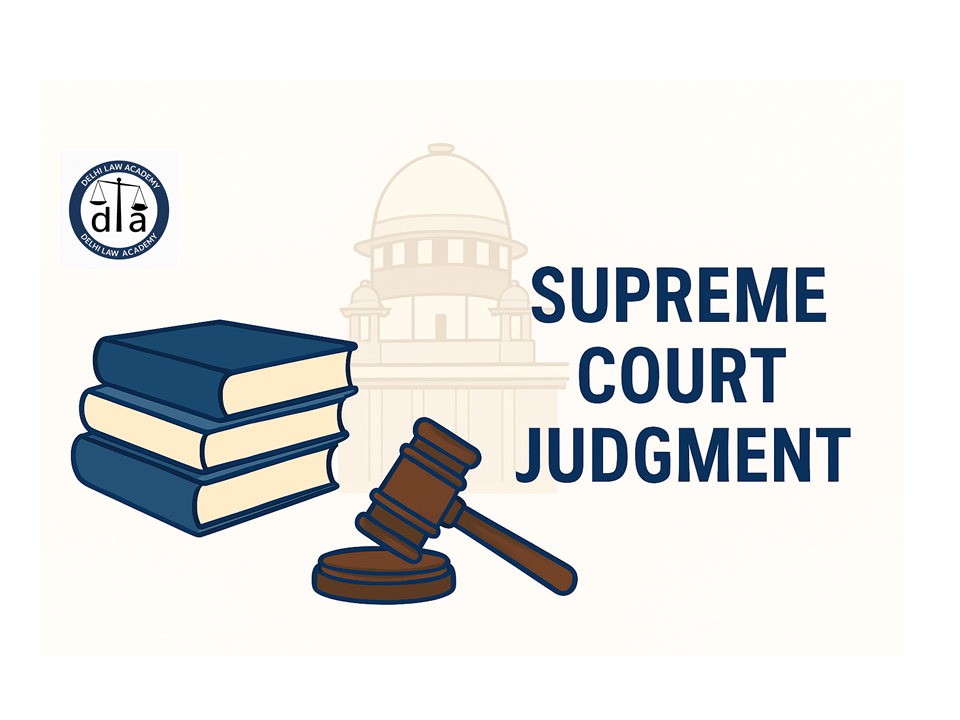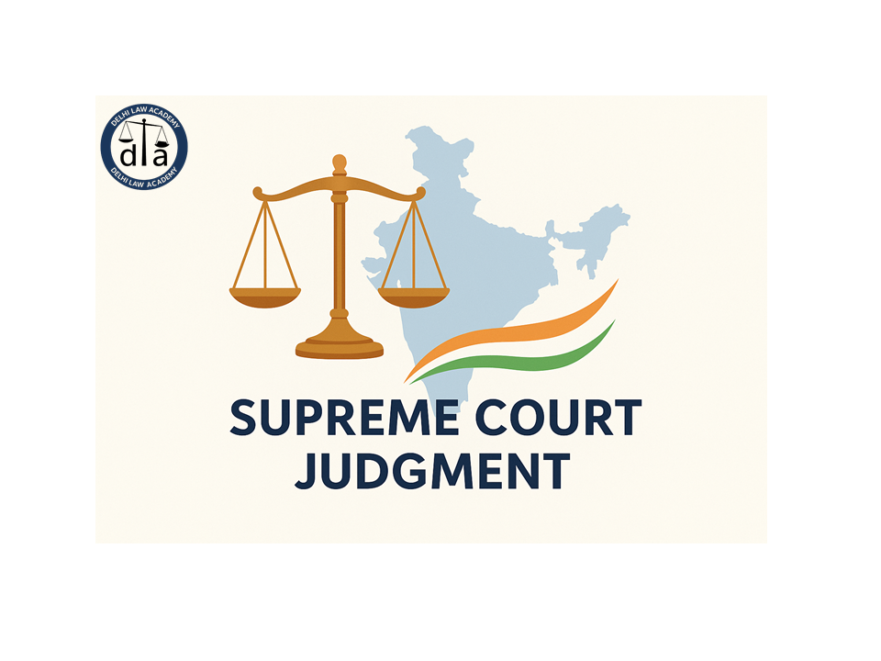
🏠 Right to Shelter is a Fundamental Right under Article 21
Delhi Law Academy Jaipur presents below for aspirants of Rajasthan Judicial Service (RJS), DJS, PCS(J) and other Judicial Services throughout India the most recent judgment of the Supreme Court of India, delivered just yesterday on 12th September 2025, declaring that the right to secure, peaceful, and timely possession of one’s home is a facet of the fundamental right to shelter enshrined under Article 21.
📜 Summarized Version of the Supreme Court Judgment
Presented below: Summarized version [by Delhi Law Academy Jaipur] of the Supreme Court Judgment in the case of Mansi Brar Fernandes v. Shubha Sharma delivered by a two-judge Bench comprising of J.B. Pardiwala and R. Mahadevan JJ. on 12 September, 2025: 50 page judgment summarized in 5 pages, while retaining the original language.
Case: Mansi Brar Fernandes v. Shubha Sharma [2025 INSC 1110]
6. The appellant (Mansi Brar Fernandes) and Respondent No. 2 (Gayatri Infra Planner Pvt. Ltd) had entered into a Memorandum of Understanding (MoU) dated 06.04.2016 which a buy back agreement for four flats in Gayatri Life at Plot No. 1F, Sector 16, Greater Noida (West), Uttar Pradesh. She paid a sum of Rs.35,00,000/- via cheque towards part consideration, and the MoU included a buy-back clause exercisable solely at the discretion of the Corporate Debtor. If the buy-back option was not exercised, the appellant was entitled to receive possession of the flats without payment of any additional amount. Despite the MoU having been extended twice (first on 07.04.2017 and second on 07.10.2017), neither flats were delivered, nor payment made; and post-dated cheques worth Rs.1 crore handed over by the Corporate Debtor, were returned dishonoured upon presentation. The appellant thereafter initiated section 7 IBC proceedings in the capacity as an allottee/ Financial Creditor, before the National Company Law Tribunal, New Delhi, besides initiating the proceedings under Section 138 of the Negotiable Instruments Act, 1881.
15. The present matter, though seemingly straightforward, provides this Court with a timely occasion to clarify and reaffirm key principles under the Insolvency and Bankruptcy Code, 2016, particularly on the role of speculative investors in residential real estate.
15.1. This case also raises a jurisprudential concern: the manner in which litigants may be protected from prejudice caused by changes in law or external factors arising after hearings conclude,…. Though Courts ordinarily take judicial notice of subsequent changes in law, the failure to do so should not operate to the detriment of any party. In the context of the present case, Article 21 demands that bona fide homebuyers receive expeditious and effective redressal before the designated fora, including the Consumer Commissions, NCLT, NCLAT, and RERA.
15.2. In this necessary in this backdrop to reiterate certain settled principles:
- 🏢 RERA remains the primary forum for redressal of homebuyers’ grievances;
- ⚖️ The IBC is a forum of last resort, intended to secure revival and completion of viable projects, not to serve as a debt recovery mechanism;
- 🏛️ Consumer forums should confine themselves to adjudicating individual service deficiencies, thereby avoiding conflicting or overlapping orders across multiple fora.
🏠 Right to Shelter As A Fundamental Right: Constitutional Obligation of the State to Protect Homebuyers
20. This Court has, in a catena of decisions, consistently held and reaffirmed that the Right to Shelter is an integral part of the right to life under Article 21 of the Constitution. This recognition casts a corresponding duty on the State to ensure access to adequate housing, particularly for weaker sections. Indeed, various welfare schemes such as the Pradhan Mantri Awas Yojana (PMAY) have been initiated by the Government to provide affordable housing.
20.1. A home is not merely a roof over one’s head; it is a reflection of one’s hopes and dreams – a safe space for a family, a refuge from the worries of the world. 🏡
20.2. ….Having invested their lifelong savings in pursuit of a home, many are compelled to shoulder a double burden – servicing EMIs on one hand, and paying rent on the other – only to find their “dream home” reduced to an unfinished building. In some cases, construction has not even commenced despite full or substantial payment. An average homebuyer may be a teacher, lawyer, doctor, IT professional, or a government employee, who has poured his or her hard-earned money into the pockets of a developer. For such individuals, a stable roof over their family’s head is all they desire. The anxiety of not having a home despite paying a fortune is bound to take a serious toll on health, productivity, and dignity.
20.3. It is therefore imperative that the life savings of a common person culminate in timely possession of their promised home. Article 21 would mandate nothing less. In Samatha v. State of A.P., this Court reiterated that the right to social and economic justice as well as the right to shelter are fundamental rights encompassed within the ambit of the right to life.
20.4. Thus, it would be thoroughly erroneous to treat home-buying as a mere commercial transaction, or worse, to reduce housing to the status of speculative instruments such as stocks, debentures, futures, or options through creative contractual devices. Housing is neither a luxury nor a commodity for speculation – it is a fundamental human need. The right to secure, peaceful, and timely possession of one’s home is therefore a facet of the fundamental right to shelter enshrined under Article 21.
20.5. The State carries a constitutional obligation to create and strictly enforce a framework wherein no developer is permitted to defraud or exploit homebuyers. Ensuring timely project completion must be a cornerstone of India’s urban policy. Equally, the State must proactively address the menace of a parallel cash economy and speculative practices in the real estate market, which artificially inflate housing costs and enable “trigger-happy” investors seeking easy exits to jeopardize the interests of genuine end-users.
Similarly, in Chameli Singh v. State of U.P., this Court observed:
“Shelter for a human being, therefore, is not a mere protection of his life and limb. It is home where he has opportunities to grow physically, mentally, intellectually and spiritually. Right to shelter, therefore, includes adequate living space, safe and decent structure, clean and decent surroundings, sufficient light, pure air and water, electricity, sanitation and other civic amenities like roads etc. so as to have easy access to his daily avocation. The right to shelter, therefore, does not mean a mere right to a roof over one’s head but right to all the infrastructure necessary to enable them to live and develop as a human being. Right to shelter when used as an essential requisite to the right to live should be deemed to have been guaranteed as a fundamental right. As is enjoined in the Directive Principles, the State should be deemed to be under an obligation to secure it for its citizens, of course subject to its economic budgeting. In a democratic society as a member of the organised civic community one should have permanent shelter so as to physically, mentally and intellectually equip oneself to improve his excellence as a useful citizen as enjoined in the Fundamental Duties and to be a useful citizen and equal participant in democracy. The ultimate object of making a man equipped with a right to dignity of person and equality of status is to enable him to develop himself into a cultured being. Want of decent residence, therefore, frustrates the very object of the constitutional animation of right to equality, economic justice, fundamental right to residence, dignity of person and right to live itself.”
Housing Boards, State-level Urban Development Authorities (e.g., DDA, GMADA, MHADA, CHB) and CPSUs should establish dedicated wings to revive and complete stalled projects under IBC mechanisms. This would instill faith in the sector, ensure affordable housing, and protect genuine homebuyers.
While this is a matter of policy falling within the exclusive domain of the Government, it cannot remain a silent spectator. The Government is constitutionally obliged to protect the interests of homebuyers and the economy at large.
22. Before parting, we observe that the right to housing is not merely a contractual entitlement but a facet of the fundamental right to life under Article 21. Genuine homebuyers represent the backbone of India’s urban future, and their protection lies at the intersection of constitutional obligation and economic policy. Through these directions, this Court seeks to restore faith in the regulatory and insolvency framework, deter speculative misuse, and ensure that the “dream home” of India’s citizens does not turn into a lifelong nightmare. 🏘️
❓ Frequently Asked Questions (FAQs)
📚 Further Reading for Law Aspirants
Explore more useful resources from Delhi Law Academy to strengthen your preparation:
Contact us
📍 Delhi Law Academy – Jaipur Branch
6C, Tower 2, Coaching Hub, Pratap Nagar, Jaipur – 302033
📞 Phone:
+91 9911916552
+91 8447285606
✉️ Email:
contactus@delhilawacademy.com

